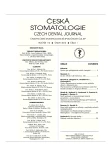-
Medical journals
- Career
Advantages and Disadvantages of Dental Miniimplants – Ten Different Viewpoints
Authors: R. Šmucler 1,2; P. Barták 1,2
Authors‘ workplace: Stomatologická klinika 1. LF UK a VFN, Praha 1; Klinika a institut estetické medicíny Asklepion, Praha 2
Published in: Česká stomatologie / Praktické zubní lékařství, ročník 112, 2012, 1, s. 23-29
Category: Review Article
Overview
So-called dental miniimplants are fast spreading pre-prosthodontics method. Number of dentists offering this method grows as well as number of existing systems. But we feel quantitative and qualitative insufficiency of the reviewed literature as main limit for future development. The authors have more than a decade of personal experience with this technology. Chosen paper title implies still incomplete picture of the actual limits of this method. But we can briefly conclude: Mini implants are predictable modality increasing retention of removable dentures. They have tiny indications in long-term fixed prosthetics. According to small diameter they are limited both aesthetically and mechanically compare to conventional implants. However, miniimplants have significant advantage in situations of limited alveolar ridge diameter and for patients with multiple contra-indications (anatomical, medical, financial, technical incapability of dentist) for conventional implants. Lover economic costs and shorter treatment time are most significant advantages, enabling access to implant treatment for wider range of dentists and patients. The article omits otherwise very successful application of this technology in orthodontics.
Key words:
miniimplant – dental implant – removable denture – medical compromised patient
Sources
1. Att, W., Stappert, Ch.: Implant therapy to improve quality of life. Quintessence International, roč. 34, 2003, č. 8, s. 573–581.
2. Balkin, B. E., Steflik, D. E., Naval, F.: Mini-dental implant insertion with the auto-advance technique for ongoing applications, Journal of Oral Implantoly, roč. 27, 2001, s. 32–37.
3. Ding, X., a kol.: Effect of diameter and length on stress distribution of the alveolar crest around immediate loading implants. Clin. Implant. Dent. Relat. Res., roč. 11, 2009 č. 4, s. 279–280
4. Chen, Y., Shin, H. I., Kyung, H. M.: Biomechanical and histological comparison of self-tapping and self-drilling microimplants in dogs. Am. J. Orthod. Dentofacial. Orthop., 2008, s. 44–50.
5. Christensen, G. J.: Mini implants: Good or bad for long-term service? Journal of Esthetic and Restorative Dentistry, roč. 20, 2008, č. 5, s. 343–348.
6. Mazor, Z., Steigmann, M., Leshem, R., Peleg, M.: Mini-implants to reconstruct missing teeth in severe ridge deficiency and small interdental space: a 5-year case series. Implant. Dent., roč. 13, 2004, s. 336–341.
7. Sendax, V. I.: Mini-implants as adjuncts for transitional prostheses. Dent. Implantol. Update, roč. 7, 1996, č. 2, s. 12–15.
8. Shatkin, T. E., a kol.: Mini dental implants for long-term fixed and removable prosthetics: a retrospective analysis of 2514 implants placed over a five-year period. Compend. Contin. Educ. Dent., roč. 28, 2007, č. 2, s. 92–99.
9. Vigolo, P., Givani, A.: Clinical evaluation of single-tooth mini-implant restorations: a five-year retrospective study. The Journal of Prosthetic Dentistry, roč. 84, 2000, č. 1, s. 50–54.
10. Wiechmann, D, Meyer, U., Büchter, A.: Success rate of mini - and micro-implants used for orthodontic anchorage: a prospective clinical study. Clinical Oral Implants Research, roč. 18, 2007, č. 2, s. 263–267.
11. Kolektiv autorů: Proceedings of the 3rd ITI Consensus Conference, Journal of Oral Maxillofac. Implants, roč. 19, 2004, Supplement
Labels
Maxillofacial surgery Orthodontics Dental medicine
Article was published inCzech Dental Journal

2012 Issue 1-
All articles in this issue
- The Occurrence of Streptococcus Mutans and Oral Health Condition in Pregnant Women
- Advances in the Pharmacotherapy of Periodontal and Oral Mucosal Diseases
- Advantages and Disadvantages of Dental Miniimplants – Ten Different Viewpoints
- The Use of Imaging Methods in the Diagnosis of Bisphosphonate-related Osteonecrosis of the Jaw
- Cleft Lip and Palate, the Initial Phase of Treatment Planning and Interdisciplinary Therapy for Patients in the Neonatal Age
- Czech Dental Journal
- Journal archive
- Current issue
- Online only
- About the journal
Most read in this issue- Advantages and Disadvantages of Dental Miniimplants – Ten Different Viewpoints
- Cleft Lip and Palate, the Initial Phase of Treatment Planning and Interdisciplinary Therapy for Patients in the Neonatal Age
- Advances in the Pharmacotherapy of Periodontal and Oral Mucosal Diseases
- The Use of Imaging Methods in the Diagnosis of Bisphosphonate-related Osteonecrosis of the Jaw
Login#ADS_BOTTOM_SCRIPTS#Forgotten passwordEnter the email address that you registered with. We will send you instructions on how to set a new password.
- Career

